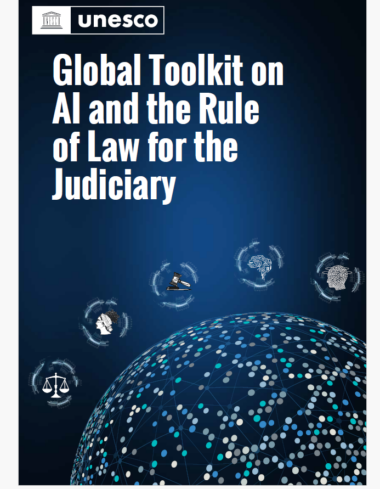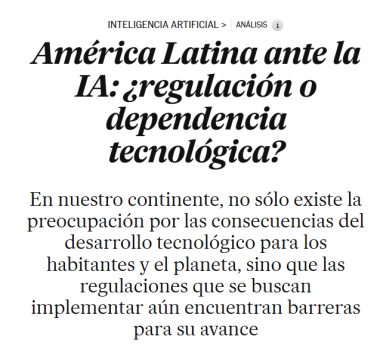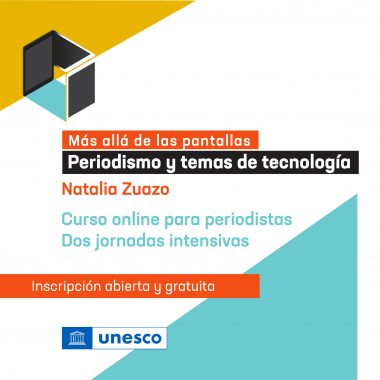More than 4,000 media professionals in Latin America and the Caribbean have been trained in technology, journalism, and artificial intelligence (AI)
Newsrooms around the world are increasingly using artificial intelligence (AI). Automating repetitive tasks, gathering news, and distributing content to subscribers are some of AI’s most common uses but its potential is growing and developing worldwide. In Latin America, however, the media are still taking the first steps in this area. According to the report “Use of Artificial Intelligence in Latin American Media”, produced by International Media Support (IMS), media organizations and professionals are hungry for knowledge and training in this area.
Along with this need as a result of technological progress, in recent years, the genre of technology journalism has also increased its presence in the media. In general, this information is presented in the form of news on products or businesses, often missing the opportunity to take a close look at the impact of technologies on people’s lives.
In response to these challenges, since 2019, UNESCO Regional Office for Science for Latin America and the Caribbean has set out to develop a programme of activities for the training of journalists and media professionals on issues related to technology and AI. The activities carried out have already impacted more than 4,000 media professionals both in the region and abroad.
The process began in 2019 with the publication of the Manual de periodismo de tecnología: Investigación, Escritura, Temas, Seguridad (Technology Journalism Handbook: Research, Writing, Issues, and Safety), a tool for the continuing education of students and reporters who wish to specialize in this professional field. Natalia Zuazo, author of the Handbook and UNESCO Consultant, explains:
“This handbook was a first step, followed by an ambitious programme to encourage the media to cover technology issues with greater depth and a more critical spirit.”
In 2020, the Knight Center for Journalism for the Americas at the University of Texas and UNESCO launched a Massive and Open Online Course (MOOC) on Internet and Technology Journalism: How to Cover its Impact Beyond Gadgets (“Periodismo de internet y tecnología: cómo cubrir sus impactos más allá de los gadgets”.) During the first version of the course, more than 2,000 students attended the four weeks of oriented sessions from 45 countries around the world.
During 2021, UNESCO, together with the International Federation of Journalists and its regional headquarters, The Federation of Journalists of Latin America and the Caribbean (FEPALC), developed the course “Periodismo y temas de tecnología, más allá de las pantallas” (Journalism and Technology Issues: Beyond the Screens). The course was attended by more than 600 journalists from 13 countries within the region to improve understanding, research and coverage of technology and Internet issues, and make them more relevant to their audiences.
Artificial Intelligence and Journalism in Latin America
In November 2021, UNESCO Member States adopted the Recommendation on the Ethics of Artificial Intelligence. UNESCO Regional Office for Science for Latin America and the Caribbean has then added the topics of this Recommendation to its training program and experts in this field to its ongoing training program.
In September 2022, the regional seminar “Contar la tecnología. Periodismo, inteligencia artificial y derechos humanos” (Talking about Technology. Journalism, Artificial Intelligence, and Human Rights) was held. The objective of the webinar, which was organized together with the Inter American Press Association (IAPA), was to contribute to the training of media professionals regarding the main current technological and social challenges. The course was held remotely and had 227 people connected from all over the region and the world.
“The aim is to empower media professionals with knowledge on the main technological challenges that society, and their own industry, is currently facing, so that the opportunities and challenges related to these emerging technologies and digital transformation are understood, investigated and reported.” said Rosa M. Gonzalez.
The Regional Advisor also invited journalists and the media to participate in the AI Observatory launched jointly by UNESCO and the IDB with the aim of mapping and better understanding the use of AI by the media and journalism within the region.
IAPA Executive Director, Ricardo Trotti, stressed the importance of information as a public service and its central role in democracy. He also presented IAPA Bot, a development based on AI that monitors, in real time, the climate of press freedom in Latin America and the conversations on the subject.
The first day of the seminar was conducted by Natalia Zuazo, who analysed how the media produce technology stories, what are the main challenges, and how to create stories that are relevant to the audiences.
“We have learned how to talk about technological innovation in a relevant, profound and complete manner, analysing the main mistakes that can be made when researching and covering these topics,” said Alessia Gaspodini, a media professional who attended the seminar from Berlin.
The second day of the seminar was led by Carolina Martinez Elebi, a specialist in IT and human rights, and Fabrizio Scrollini, director of the Latin American Open Data Initiative (ILDA).
Martínez Elebi presented UNESCO Recommendation on the Ethics of Artificial Intelligence, so that journalists could get to know and apply it. Fabrizio Scrollini referred to the status of AI regulation in Latin America and explained that the reality on the continent is complex, as countries are still developing strategies related to AI.
“Countries cannot afford to ignore this issue. Those who have the power should tell how and why certain decisions are made,” he said.
Published at: https://en.unesco.org/news/more-4000-media-professionals-latin-america-and-caribbean-have-been-trained-technology








